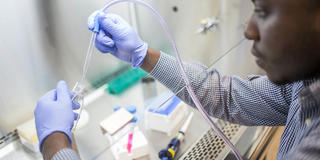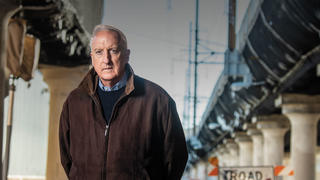
Institute of Clinical Bioethics
Developing and promoting interdisciplinary research, educational programs, academic courses, clinical consultation and policy development services in the field of bioethics.
The Institute of Clinical Bioethics at Saint Joseph’s University was founded on August 28, 2006, with the mission to develop and promote interdisciplinary research projects, educational programs, academic courses, clinical consultation and policy development services in the field of bioethics to meet the individual needs of the Saint Joseph’s University academic community, the medical, nursing and administrative staffs of the Philadelphia area Catholic and nonsectarian healthcare systems, and the Archdiocese of Philadelphia.
The Institute is committed to educating healthcare professionals to be effective leaders in education, medicine and society. The Institute is also committed to understanding and respecting the role of religious and spiritual traditions, especially that of the Roman Catholic theological and philosophical tradition, in healthcare decision-making. The Institute promotes the ideals of Jesuit education in seeking to challenge others to be “men and women for others” in the “service of faith and the promotion of justice” in its teaching, research and service. Thus, while giving special regard to Catholic healthcare ethics in teaching and research, the Institute also fosters respectful dialogue among all traditions represented in the student body and the patient population.
One Mission: Three Constituencies
-
There are three interrelated constituencies of the Bioethics Institute: the Saint Joseph’s University academic community, healthcare professionals and administrators at affiliated or contract hospitals, nursing homes, etc. in the Philadelphia area, and the Archdiocese of Philadelphia.
-
The Institute conducts outreach to medical and nursing staffs and the administration of healthcare or medical institutions affiliated with Saint Joseph’s University. Since some of these institutions are part of a larger healthcare system (Catholic Health East), it is possible that educational programs could be extended to benefit this larger system as well. In some instances, the subject matter of the research carried on at Saint Joseph’s University (e.g., in the Fellows’ Research Program) could be focused on the needs of the affiliated institutions (e.g., to write a specific policy for the medical hospital staff). Such an outreach program to the affiliated institutions is consistent with the general mission of Saint Joseph’s University in its attempts to enhance the educational opportunities of professional groups.
Clinical and Policy ConsultationThe Director (and possibly one or more of the Fellows) is available as a professional resource for clinical consultations to the medical and nursing staffs of the affiliated institutions and to aid in the development of policies for the administration. In addition, the Director can participate on in-house Institutional Ethics Committees, Institutional Review Boards, Organizational Ethics Committees, Tumor Boards, etc. and to serve as a resource for these committees to achieve their objectives. The primary role of the Director while at theses affiliated institutions is to supplement the resources already present at the clinical site. Thus, the work of the Director in the hospitals is not designed to replace or substitute for what is already in place.
Bioethical Education for Medical Personnel/Hospital Administrations at Affiliated InstitutionsFrom time to time, lectures (e.g., Grand Rounds), workshops and symposia will be offered by the Director of the Institute to the medical and nursing staffs and hospital administration on issues related to bioethical concerns of the hospital. Their primary purpose will be to offer professional educational opportunities to these audiences, and, once again, the goal is to supplement the resources already present in the hospital. The Director of the Institute is also be responsible for teaching the ethics core curriculum to the medical interns and residents at the affiliated institutions. The training of in-house bioethics committee members is also a priority of these educational programs.
-
From the research and educational programs that have been created at Saint Joseph’s University by the Bioethics Institute and at the invitation of the Cardinal of Philadelphia, there is a pastoral outreach to the Archdiocese of Philadelphia. Such an outreach program is truly consistent with the mission of Saint Joseph’s University.
Available to Serve as a Bioethics Consultant to the Cardinal of Philadelphia
At the request of the Cardinal, the Director can be available to serve as a professional consultant on matters related to bioethics in the Archdiocese. In this capacity, the Director can offer advice to the Cardinal on specific issues that confront the Archdiocese, e.g., physician-assisted suicide legislation, stem cell research, etc. The Cardinal could also request the writing and/or review of position papers on bioethical issues related to Archdiocesan concerns. In the latter instance, the Director may well establish a research protocol at Saint Joseph’s University and utilize the resources of the Fellows’ research in the Institute to accomplish this goal.
Available to Serve as Resource for Archdiocesan Offices Related to Healthcare
At the request of the Cardinal, the Director (and/or possibly some of the Fellows) can serve as professional resources for the various Archdiocesan offices related to healthcare. At their request, the Institute could provide advice on bioethical issues, write position papers, or serve as experts to testify on behalf of the Archdiocese’s concerns related to bioethical issues, e.g., physician-assisted suicide, stem cell research, pain management, etc. In addition, from time to time, lectures or symposia could be presented to the clergy and/or other personnel in the Archdiocese on bioethical issues, e.g., end-of-life issues, beginning-of-life issues. The Director could also focus one of the research projects at Saint Joseph’s University on an issue requested by the Cardinal or his representative in the Archdiocese. -
The Institute utilizes different venues in order to inform students, faculty, staff, administration and the lay public of the developments within the expanding field of bioethics through regularly-scheduled public lectures, classes, symposia and other events. In addition, there is an on-going interdisciplinary research component to the Institute. Qualified and interested faculty from around Saint Joseph’s University and other processionals external to Saint Joseph’s University will be invited to participate in research projects related to the field of bioethics.
Richard McCormick, S.J. Bioethics Lecture
This lecture is an annual, formal lecture on a specific issue in bioethics, sponsored by the Institute of Clinical Bioethics of Saint Joseph’s University and featuring members of the University community, figures in the health care community of Philadelphia, or sometimes nationally known figures in the field.
Lectures/Symposia
Each year there is a lecture or symposium for the university and lay community on some issue of interest in the field of bioethics. Usually more informal than the annual public lecture, this sometimes consists of presentations of the results of the Fellows’ research that was sponsored by the Institute during the academic year.
Interdisciplinary Research: Fellows Program
One of the principal goals of the Institute is to carry on collaborative, interdisciplinary research in the field of bioethics. With the approval of the Provost of Saint Joseph’s University, faculty who are interested in bioethics from campus, e.g., members of the theology, philosophy, biology, interdisciplinary health services, health administration, pharmaceutical marketing, and other business departments; and professional from affiliated institutions and the Philadelphia area will be invited to participate in the Institute as Fellows.Saint Joseph’s University Graduate students will be invited to participate as Associate Fellows. In the Fall, the Director of the Institute, in consultation with the Advisory Board, establish research projects that will be undertaken during the following academic year. Sometimes, the clinical or pastoral needs of the other constituencies will be subject-matter for the research projects of the Fellows. Each Fall semester Saint Joseph’s University faculty will be invited to present applications to participate in the Institute’s research project during the following academic year. Among the applicants, two faculty will be selected by the Advisory Board. After consultation with the respective Dean (s) and approval of the Provost of Saint Joseph’s University, each of these faculty will be granted a reduction of one course in their teaching responsibilities for the year in which he/she participates in the Institute. The Fellows will share their expertise and research with the other members of the Institute and, when appropriate, with the members of the other two constituencies. The results of some of these projects may result in a symposium for the university community and/or in a publication from the Institute.
Affiliated Scholars Program
International and national scholars in the area of Bioethics can be named as Affiliated Scholars in the Institute. In this capacity they are listed as part of the extended faculty of the Institute of Catholic Bioethics and can actively participate in the Institute’s seminars, assist in teaching courses at the Institute, deliver papers at Institute workshops and serve as Bioethics consultants to affiliated medical institutions for consultations, policy development, seminars, Grand Rounds, etc.
Courses for Saint Joseph’s University Undergraduate and Graduate Students
The Director of the Institute has the responsibility to develop and teach courses in the field of bioethics at all levels of the curriculum for Saint Joseph’s University students. From time to time, courses could be offered in other colleges and schools at Saint Joseph’s University.
Continuing Education Program
From time to time, the Director and/or Fellows may offer a short course in the area of Continuing Education. This will include Continuing Medical Education (CME) courses and Continuing Education Programs for Certified Health Education Specialists (CHES). The participants of this course might be physicians, nurses, chaplains at hospitals, hospital administrators, Archdiocesan personnel connected to healthcare delivery, etc. These courses will come under the control of the Dean of the University College.
Latest News
-
- Fredy Abboud, Peter Clark, Steven Silver, Adamya Aggarwal, Aidan Fogarty, and Caroline Curtin. "Institute of Clinical Bioethics' Undergraduate Research Fellowship Program: A Paradigm for Educating and Empowering Ethically Oriented Healthcare Professionals"
- Fredy Abboud, Dan DiSandro, Joe Kelly, Joel Koshy and Dr. Jaison Santhi their book chapter: "The 2024 H5N1 Virus Outbreak: Navigating the Tightrope Between Containment and Caution" in Global Bioethics: Current Challenges, New Developments and Future Directions.
Click here to see the institute's full list of publications.
-
-
The Institute Fellows and Volunteers host monthly free healthcare clinics at the Mexican and Guatemalan Consulates. At these clinics, students and residents provide health screenings (height, weight, BMI, glucose/cholesterol readings, etc.), dental screenings/cleaning, eyeglasses, adult/prenatal vitamins, baby boxes, and more. We saw 45 undocumented individuals.
-
The director of the Institute of Clinical Bioethics, Dr. Peter Clark, did Grand Rounds and Ethics Teaching Rounds with our medical residents at Caritas Baby Hospital in Bethlehem, Palestine.
Contact Us
The Institute of Clinical Bioethics
Saint Joseph's University
Barbelin Hall
5600 City, Philadelphia, PA 19131
(610) 660-3425
